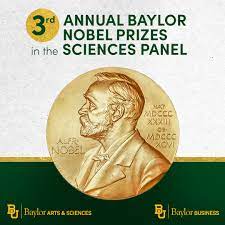By Ariel Wright | Reporter
The third annual Baylor Nobel Prizes in the Sciences Panel was hosted by the Hankamer School of Business and the College of Arts and Sciences Tuesday. The panel included faculty from multiple disciplines, each focusing on Nobel Prize winners from their respective research fields.
The theme of the Nobel Prize Summit 2023 was “Truth, Trust and Hope,” highlighting discoveries contributing to a sustainable, resilient, peaceful and prosperous future. At the panel, faculty presented on nanoparticle research, vaccine research, attosecond physics and the economics of women in the labor market.
Dr. Julia Chen, professor of chemistry and biochemistry, presented the Nobel Prize-winning research of Moungi G. Bawendi, Louis E. Brus and Aleksey Yekimov. These researchers made significant findings related to nanoparticles and their molecular properties. According to a Nobel Prize press release, they have been credited with planting an important seed in technology due to their discovery and synthesis of quantum dots.
“The lecture that stood out most was the quantum dots, because it was just a simple observation of how changing the size of compounds and molecules somehow affected the physical appearance of those substances,” Austin freshman Anna Behr said. “What was fascinating was how they spent years using those observations and studying them in order to benefit the world.”
Chen utilized a number of comparisons to explain the research, making otherwise high-level concepts more digestible for students who haven’t had the chance to dedicate decades to the field.
“I didn’t realize how small quantum dots were until I had the visualization of when you think of one soccer ball and comparing it to the entire globe,” Houston senior Taylor Belger said. “And somehow, they’re studying these quantum dots that are that same comparison. … That size difference is absolutely impossible to fathom, but very interesting for chemistry.”
Disciplines outside of the typical sciences were included as well. Dr. Zachary Ward, associate professor of economics, presented the Nobel Prize-winning research of Claudia Goldin — an economic historian and labor economist at Harvard. According to a Nobel Prize press release, Goldin is credited with having advanced the understanding of outcomes for women in the labor market.
“I never really thought about how women used to be involved in the workforce a very long time ago — and how it could have decreased and increased again,” Behr said. “That was just a different perspective I had never really thought about on economics and women in the workforce.”


